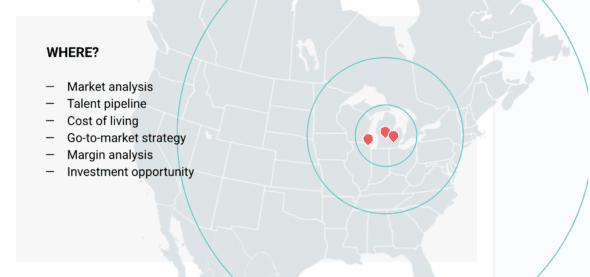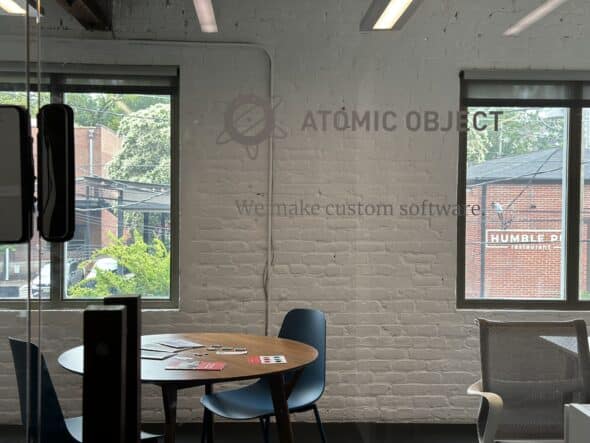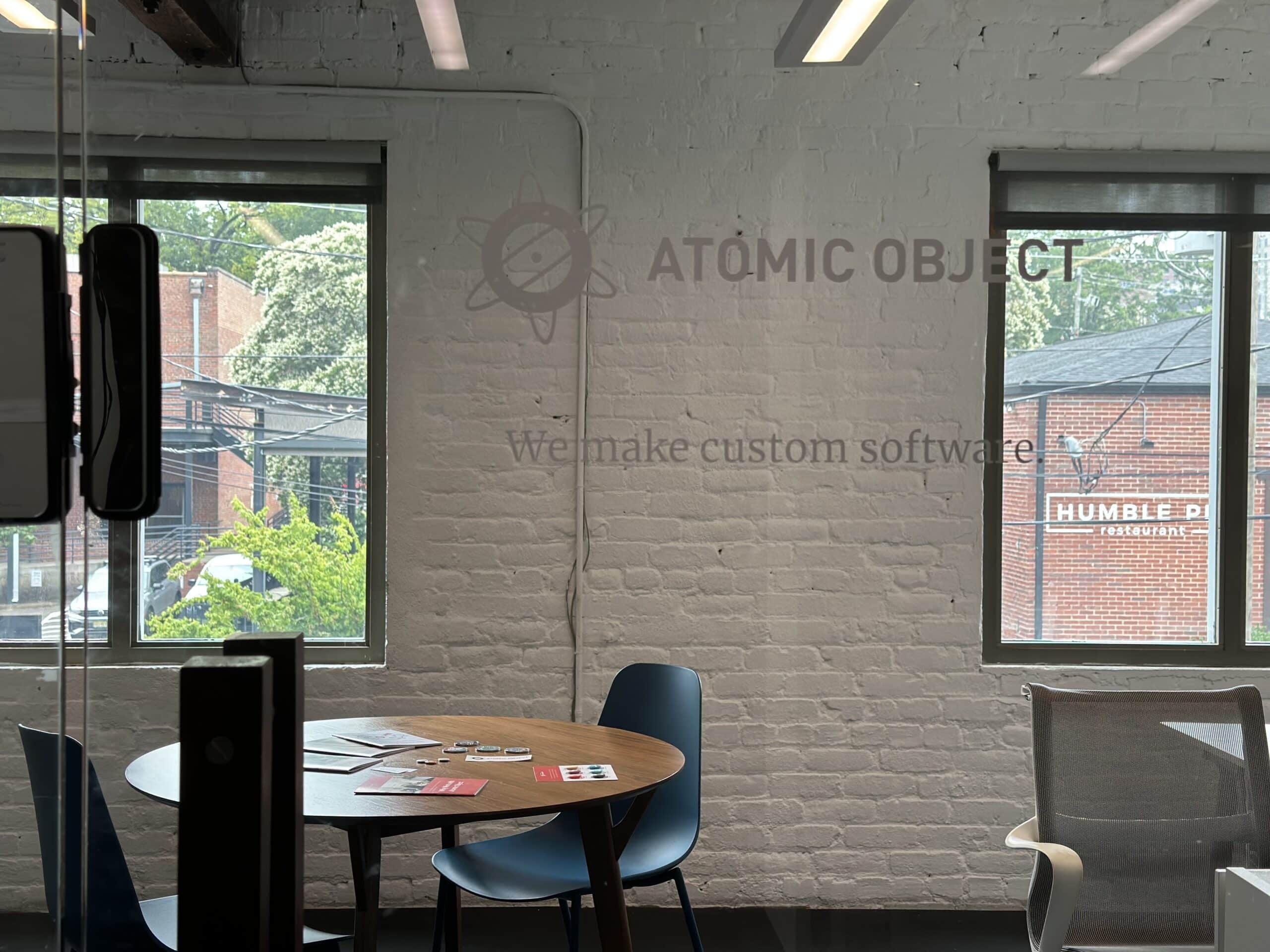It was June 28, 2021, and my colleague Taylor Vanden Hoek and I had just finished pitching Mike and Shawn, our Co-CEOs, on us leading Atomic’s next office. We outlined how we complement each other’s strengths, and how we are hungry for this opportunity. We proposed a high-level roadmap from idea to open. Oh, and we had no idea where this office would be! We went from idea in June 2021 to Atomic Raleigh-Durham in 2023.
Here’s the slide we shared on location:

Mike and Shawn were excited that we stepped forward for this opportunity, and the first task they gave us was finding Atomic’s fourth home.
What followed was eight months of brainstorming, research, refinement, and conversations. Here’s how we went from idea in June 2021 to working in this beautiful space in 2023.

Brainstorming and Initial Refinement
Much like an Atomic project kickoff, we started by generating all sorts of ideas. Any city that was appealing personally or professionally went into a spreadsheet. Our list included locations such as:
- Wellington, NZ
- Toronto, Canada
- Wilmington, Delaware
- Dublin, Ireland
Personally, I’m excited to stick around at Atomic long enough for our New Zealand office to open.
After we generated our list of 35+ cities, we took an initial pass to cross off the dream pipe ideas. For example, we knew that going international would introduce a bunch of overhead for the business, so those were non-starters. States that were actively working against women’s rights were also taken off.
Data Gathering
With the remaining list of semi-legitimate contenders, it was time to gather some data.
In order for Atomic to be successful in a market we need to be able to hire exceptional talent, generate regional demand, and offer reasonable rates to our clients.
With these requirements in mind, we gathered the following data for each city:
- Metro population
- Universities within 50 miles
- Major industries
- Existing custom software companies (competitors)
- Cost of living
Second Refinement
Next, we looked at our two existing flagship markets, Ann Arbor and Grand Rapids Michigan. We knew that Atomic could be successful in markets like those because we were already doing it.
We gathered the same data for our existing markets and used those as our benchmarks. Essentially, we were setting up a goldilocks scale, not too much outside of our existing markets in either direction.
We set boundary conditions for green, yellow, and red for each datapoint listed above. For example, we turned the Cost of Living metric into a percentage comparison to Grand Rapids. Boston was 150% on that scale (red) and Columbus Ohio was 91% (green).
After we had our Goldilocks scale, we eliminated cities that were red in multiple datapoints. That left us with a manageable list of a dozen or so locations, but we weren’t closing in on one particular city. So, we decided to get our spouses involved.
Abel-Hoek Metric
Mike and Shawn were fantastic to collaborate with throughout the entire process. One thing they told us was it’s equally important that we were choosing a location that we (and our families) would be excited to call home.
Because Taylor and I had built such a strong working relationship, we knew that we valued different things personally in a new home. So, we created the Abel-Hoek metric.
The Abel-Hoek metric allowed us each to select five personal metrics for each city, ranked from most important to least. My metrics included weather, diversity, and food. Taylor’s included walkability and cultural destinations.
We scored each of the remaining cities for our metrics. Then we created a weighted aggregation metric for each city (based on the sum of individual metric scores weighted by importance).
Final Refinement
Taylor, Nate (her spouse), Erin (my spouse), and I got takeout one fall night in 2021 to discuss the remaining cities. In very Atomic fashion, we decided to employ a design thinking activity to narrow our list further.
We placed the top eight locations on notepads and stuck them to the wall. We each got a set of stickers to vote with and we could place one or more on any of the remaining cities.
After the voting was done, we had a final list of five cities that we knew were viable from a business perspective and desirable from a personal standpoint.
Raleigh, North Carolina
After a final pass through the cities and some further discussions with Mike and Shawn, we landed on Raleigh-Durham North Carolina.
It’s undeniable that North Carolina is a booming state for business. CNBC ranked it the top state for business in both 2022 and 2023. Raleigh constantly appears in the media for its exploding tech scene. Research Triangle Park is a vital innovation site for many of the big life science organizations. Companies such as IBM and Red Hat call it home.
The young talent being cultivated in the area is second to none. NC State, Duke, UNC, and a number of other universities in the area are putting an emphasis on technology and entrepreneurship. It’s evident in the student-led startups and VC success stories coming from the area.
So Far? Validated
After we made the selection final, we dedicated time visiting North Carolina to get to know the movers and shakers in the area. What we’ve found is a collaborative, friendly, helpful, and energetic community. Here are just a few examples of the amazing relationships and interactions we’ve been able to have in just a few short months.
Raleigh Founded is a co-working space by industry, but they offer so much more. Their team is engrained with the local tech community. They organize top-notch community events, they give back, and they are always looking to make great connections for others.
Scot Wingo, a serial entrepreneur, Raleigh business advocate, and overall very busy person, took an hour out of his day to have lunch with us based on a few cold outreaches. He shared helpful insights into the community, the direction it was heading, and where we could plug in to begin making a difference.
The Center for Entrepreneurial Development (CED) spent time getting to know us and the value we bring to clients. It’s led to us partnering with them to help guide early-stage local entrepreneurs.
2ndF is an organization driven to grow the Triangle ecosystem inclusively through education and investment. Liam from 2ndF has become a personal friend and has made several exceptional connections for us.
I’m so excited to continue plugging into this thriving and welcoming community. If you want to chat and give me restaurant recommendations, chat about your ideas/challenges, or just meet a new person in the Triangle, please don’t hesitate to connect and message me on LinkedIn!

